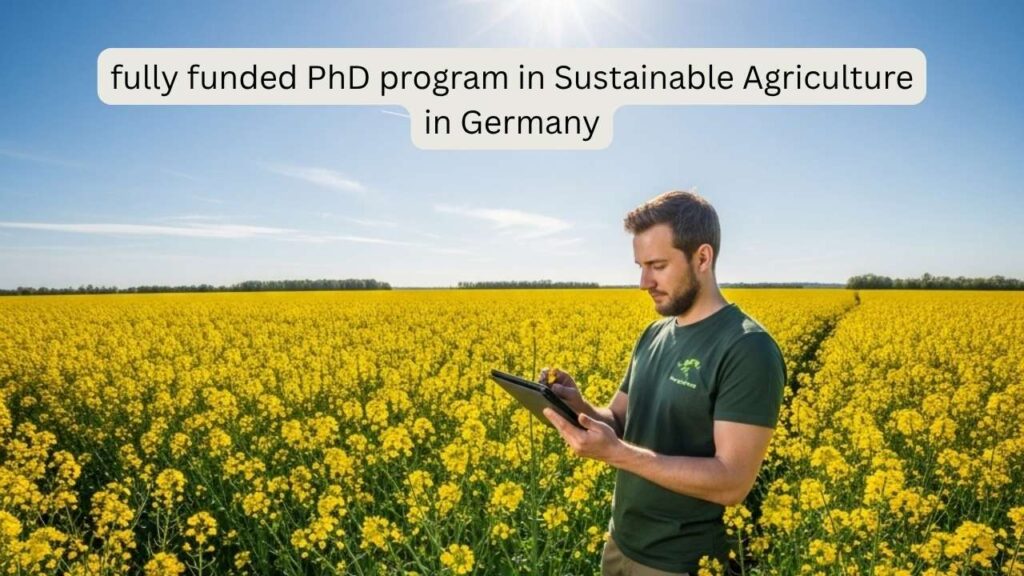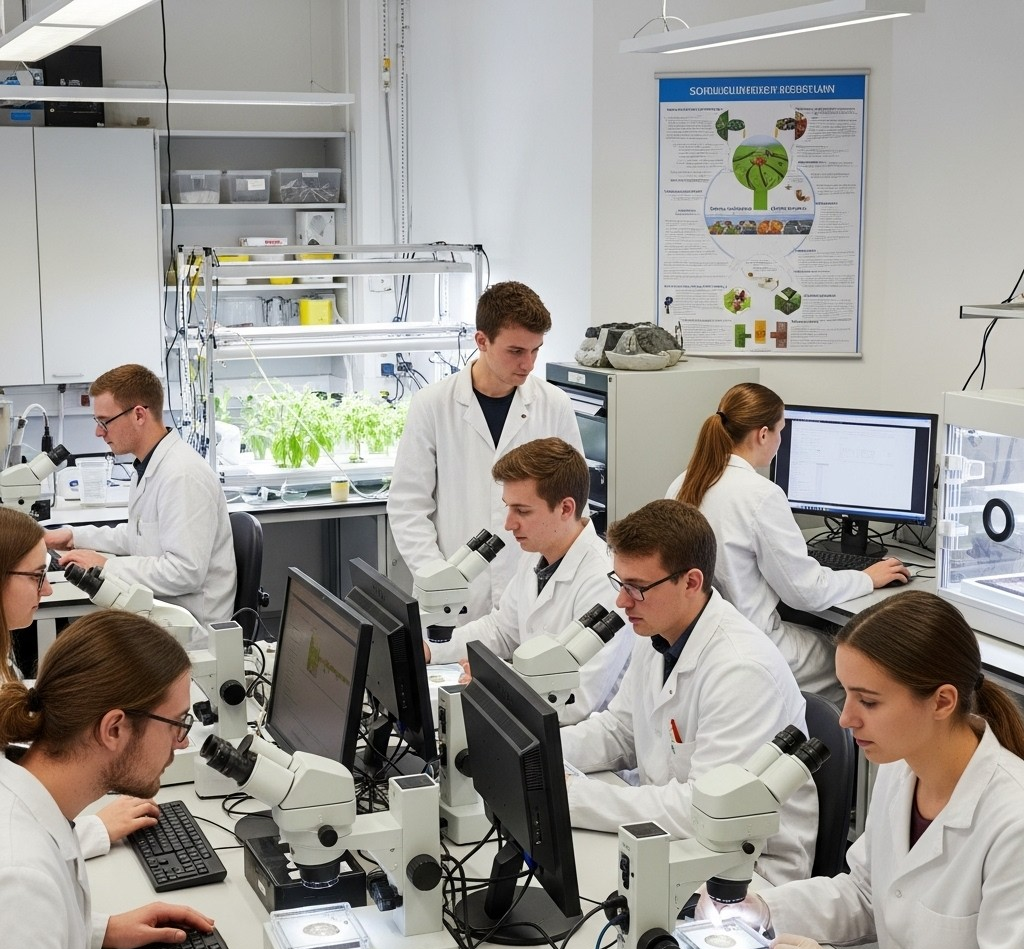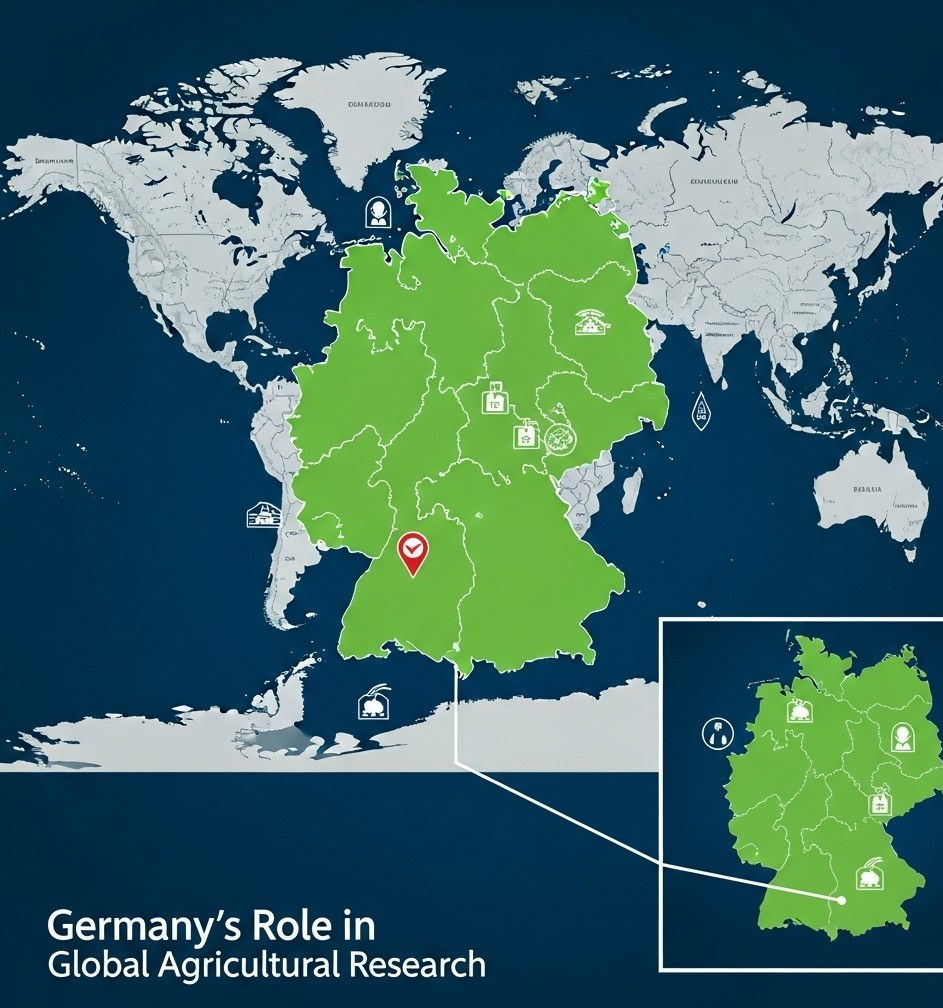Are you passionate about tackling global challenges like food security, climate change, and environmental degradation? Do you envision a future where agriculture thrives in harmony with nature? If so, a fully funded PhD program in Sustainable Agriculture in Germany could be your gateway to making a real, tangible impact. Germany, a global leader in scientific research and innovation, offers unparalleled opportunities for aspiring doctoral candidates eager to delve into the complexities of sustainable food systems. This article will walk you through everything you need to know to successfully navigate the application process and embark on this life-changing academic journey.

Fully Funded PhD in Sustainable Agriculture in Germany
| Key Fact | Detail/Statistic |
| Primary Funding Source | The DAAD (German Academic Exchange Service) is the largest scholarship provider, offering comprehensive support for international doctoral candidates. |
| Monthly Stipend for PhDs | As of February 2026, DAAD doctoral candidates can expect monthly payments of €1,400, covering living expenses. DAAD Website |
| Application Deadlines | Vary by program; generally, for winter intake (October start), applications are between May and July. For summer intake (April start), applications are typically November to January. DAAD scholarship deadlines for a PhD beginning in the next year often fall in October of the current year. |
| English Language Proficiency | Many PhD programs in sustainable agriculture are taught in English. IELTS (typically 6.5-7.5) or TOEFL (iBT at least 81) scores are commonly required. |
| Cost of Living (Monthly Estimate) | A single person (e.g., a student) in Germany needs at least €992 per month to cover living expenses, excluding rent. Rent varies significantly by city (€430-€1,500 for a one-bedroom apartment). Fully funded programs often cover these costs. Studying-in-Germany.org |
Embarking on a fully funded PhD program in Sustainable Agriculture in Germany is an ambitious yet incredibly rewarding endeavor. It’s an opportunity to contribute to a field of immense global importance, to learn from leading experts, and to build a truly international network. While the application process requires diligence and strategic planning, the resources and support available are extensive. Start your preparation now, define your vision, and take that decisive step towards cultivating a more sustainable future. Germany is ready to welcome the next generation of agricultural innovators – are you?
Why Germany for Your Sustainable Agriculture PhD?
Germany stands out as a premier destination for doctoral studies, especially in fields critical to global sustainability.1 Its universities and research institutions are at the forefront of agricultural science, boasting cutting-edge facilities, interdisciplinary approaches, and a strong emphasis on practical, impactful research. Beyond the academic prestige, the appeal of a fully funded PhD program in Sustainable Agriculture in Germany is undeniable. It means you can focus entirely on your research without the financial burden often associated with higher education.

Navigating the German PhD System: Individual vs. Structured Programs
Germany offers two main pathways for doctoral candidates:2
- Individual Doctorate (Traditional Model): This is the most common route, where you independently conduct research under the supervision of a professor (Doktorvater or Doktormutter). It offers immense flexibility in shaping your research topic and methodology. To pursue this, you’ll need to identify a potential supervisor whose research aligns with your interests and secure their acceptance. This often involves preparing a strong research proposal outlining your intended project.
- Structured Doctoral Programs: These programs are more akin to PhD programs in other countries, with a set curriculum, coursework, and often a cohort of fellow PhD students. They provide a more structured environment with defined timelines and often integrated supervision. Many of these programs are interdisciplinary and specifically designed for international students, with courses often taught in English.
Finding Your Perfect Program and Supervisor
This is arguably the most critical step. My experience advising students shows that a well-matched supervisor and a compelling research proposal are cornerstones of a successful application.
- Define Your Research Interests: Be specific about what aspects of sustainable agriculture you want to explore. Do you care about soil health, water management, plant genetics, agricultural economics, or policy?
- Explore Universities and Research Institutions: Germany has numerous institutions with strong agricultural science departments.
- The DAAD database and the Higher Education Compass are excellent starting points to find universities and specific programs.
- Universities like the University of Göttingen, University of Hohenheim, University of Bonn, and Justus Liebig University Giessen are renowned for their agricultural and sustainability research. You might find programs like the “PhD Programme in Agricultural Science (PAG)” at the University of Göttingen or specific research groups focusing on agrogeophysics or sustainable land use systems.
- Look for specific research institutes like the Leibniz Centre for Agricultural Landscape Research (ZALF) or Max Planck Institutes, which often have collaborations with universities for doctoral research.
- Identify Potential Supervisors: Once you have a shortlist of universities or programs, delve into the faculty profiles. Look for professors whose publications and ongoing research align with your interests.
- When reaching out to a potential supervisor, craft a concise, well-structured email. Introduce yourself, state your specific research interests, and briefly explain why their work resonates with you. Attach your CV and a brief research proposal (even a preliminary one) to demonstrate your academic rigor and show you’ve thought deeply about your topic. Avoid generic emails; personalize each one. I’ve seen many successful applicants make this initial contact a powerful first impression.
- The DAAD offers valuable guidance on how to find a German PhD supervisor or research partner.
Application Requirements and Timeline
While specific requirements vary by university and program, here’s a general overview:
- Master’s Degree: An outstanding Master of Science (MSc) degree or equivalent in agricultural sciences, environmental sciences, biology, or a related field is almost always a prerequisite. An “above-average” grade is usually expected (e.g., a good grade in your undergraduate degree, minimum second-class upper division).
- Language Proficiency: Many sustainable agriculture PhD programs in Germany are taught in English. You’ll likely need to provide proof of English proficiency through tests like IELTS (typically 6.5-7.5) or TOEFL (iBT at least 81 points).11 While some universities might accept a letter of English proficiency from your previous university, standardized test scores are generally preferred and often required. For programs taught in German, you’ll need certified German language skills (e.g., TestDaF, DSH).
- Research Proposal: This is crucial, especially for individual doctorates. It should clearly outline your research question, methodology, expected outcomes, and relevance to sustainable agriculture.
- Curriculum Vitae (CV): A comprehensive overview of your academic and professional background.

Timeline for 2026 Start:
- 12-18 months prior (mid-2025): Begin your research on universities, programs, and potential supervisors. Start refining your research proposal.
- 9-12 months prior (late 2025 – early 2026): Contact potential supervisors, prepare your application documents (CV, motivation letter, research proposal), and take language proficiency tests (IELTS/TOEFL).
- Application deadlines (typically May-July for Winter 2026 intake, or November-January for Summer 2027 intake): Submit your applications. For DAAD scholarships, deadlines for a 2026 start often fall in October 2025.
- Admission and Scholarship Decisions (August-September 2026 for Winter intake): Universities will notify you of admission. Scholarship decisions for DAAD are often announced around April for the following academic year.
- Visa Application (post-admission): As soon as you have your admission and funding confirmation, apply for your visa.
The Excellent Mandarin Programme (EMP) Scholarship 2026 at Nottingham Trent
The Rhodes Scholarships for China 2026 at the University of Oxford
FAQ
Q1: What is the average duration of a PhD in Sustainable Agriculture in Germany?
A PhD in Germany typically takes between three to five years to complete, depending on the program structure (individual vs. structured) and the complexity of your research.
Q2: Do I need to speak German to pursue a PhD in Sustainable Agriculture in Germany?
While many programs, especially structured ones for international students, are taught entirely in English, having basic German language skills can significantly enhance your daily life and integration into German society. Some programs may also require German proficiency depending on the research focus.
Q3: Can I work part-time while pursuing a fully funded PhD in Germany?
While your funding typically covers living expenses, international PhD students on a student visa are generally allowed to work up to 120 full days or 240 half days per year. However, it’s crucial to check for any restrictions related to your specific scholarship or visa type. Many paid PhD positions are considered full-time employment, so additional part-time work might not be feasible or permitted.
Q4: How important is a research proposal for a PhD application in Germany?
A research proposal is extremely important, particularly for individual doctorates. It demonstrates your ability to conceptualize, plan, and execute a research project, and it’s a key tool for supervisors to assess your potential and determine if your interests align with their expertise.










